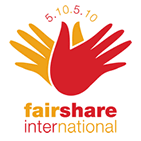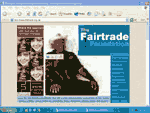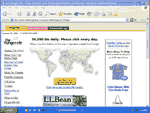Narrowing the gap between rich and poor through redistributing wealth
Click to jump to:
- What aid organisations should I give my money to?
- What is the Tobin Tax?
- Australian Council for Overseas Aid
- New Internationalist magazine
- Fair Trade Foundation
- Oxfam Community Aid Abroad
- The Hunger Site
WHAT AID ORGANISATIONS SHOULD I GIVE MY MONEY TO?
More and more overseas aid and development organisations are asking for contributions, and their advertising material is coming to us through an increasing number of channels. The marketing techniques used are also increasingly sophisticated. All of this can make it very hard to choose.
There is no one right answer as to where your money can make the best impact on poverty and injustice. It is probably safe to say that most Australia-based development organisations have made big strides in learning in the last two decades, and at their best, target resources much better to where they will make the greatest change. Different organisations emphasise different aspects of aid - health, education, human rights, agriculture and food supply, disaster relief, the environment - and operate in different areas of the world. It is legitimate that you may want to choose between these.
In every case, though, it is fair that you will want to ASK SOME CLEAR QUESTIONS about how your money is used, and particularly if you are looking to make a substantial or regular contribution, aid organisations should be willing to answer these.
Some basic questions are:
- How much of the funds raised go to the programs and projects overseas, in proportion to what is spent in Australia?
- In Australia, what kind of salaries are paid to staff? Are the top levels excessively high? Do staff at the bottom level get basic decent pay and conditions?
- Has the organisation signed on to the Code of Conduct of the Australian Council for Overseas Aid (ACFOA), ensuring basic ethical practice?
- Once the money is overseas, how much goes to local people and organisations, and how much is spent on the agency's infrastructure - particularly salaries for expatriate staff, vehicles, etc?
- Does the organisation work to support local people developing their own solutions to poverty, and strengthen local community and government capacity, or does it maintain dependency on hand-outs?
- Look at the organisation's advertising: Does it present people in developing countries as 'victims', needing charity and handouts, or does it emphasise their ability and willingness to take control of their own lives?
- Does the organisation have a policy on equity for women? Do its programs attempt to tackle the double burdens of work borne by women in many countries, and the extra disadvantages many suffer in terms of access to health and educations services?
Most organisations will send standard packs of information as an initial response to these. Do READ CAREFULLY, and ask again for explanation about what is not clear.
Do consider making a regular contribution to one organisation, rather than responding to periodic appeals. This ensures a more cost-effective use of what you give, as the publicity and organisation of high-profile appeals takes up a much larger proportion of what is given than do regular contribution programs - even when the mail-outs you receive are taken into account. It also allows organisations to plan their budgets better, and so commit to long-term development needs.
Information provided by a high profile Aid Organisation for the benefit of all of us - with thanks from FSI.
WHAT IS THE TOBIN TAX ?
(For more info, go to www.tobintax.org.uk)
(This article arose from the follow-up session on the Backhouse Lecture at AYM in Hobart. During discussion the Tobin Tax was mentioned but little concrete information was available to those interested in learning more. The sources used for what follows include the Internet, the Weekly Guardian, the New Internationalist and material supplied by the Australian Council for Overseas Aid [ACFOA].) Heather Saville.
Our own dollar has fallen and it probably doesn't make much difference in our lives unless we are planning an overseas trip. However, for many countries a run on their currency - as happened during the Asian economic crisis in 1997 - can have catastrophic consequences. The world of international finance has become a global casino, where investors seeking quick profits bet huge sums around the clock. Unlike investments in goods or services, speculators make money from money alone. No jobs are created, no services provided, no factories built and no widgets produced.
This form of financial speculation seems to be an irresistible force: it is faceless, devoid of any moral sense and leaves in its wake many entirely innocent victims in countries where the debt burden is already high. If a country's loans have to be repaid in US dollars and their currency is suddenly devalued by 30% because of financial speculation it means that the cost of repaying that loan has just increased by 30%. As a result social programs have to be cut, affecting the most needy in any society.
There are many reasons why the value of a currency varies, but changes to the international financial system in recent years have meant that national governments are more limited in their ability to intervene. As national economies become more integrated and less protected from foreign speculation, individual countries will continue to experience this "run on their currency" with speculators gambling on hourly and daily fluctuations in the peso, the Australian dollar, the South African rand, or the Thai bhat. Money is sucked out of one economy as if by magic, leaving nothing in its wake but harm, and providing huge, frequently taxfree, profits for those doing the sucking.
Enter the Tobin Tax. In 1978 a visionary American economist, James Tobin, proposed a levy on international currency transactions. His aim was simple: a small tax - between 0.1 and 0.5% -applied to foreign exchange trading, designed to reduce exchange rate volatility and discourage currency speculation. In his proposal, the proceeds of the levy would be devoted to international development aid. The greater the frequency of transactions, the higher the effective tax rate. This would mean that those "playing the money market" would be most affected, whilst the levy would not inhibit genuine international trade, or long-term capital flows.
At first little attention was paid to Professor Tobin's proposal, but in recent years, as international financial speculation has increased and its effects become clearer, support has been growing. It is coming from the international trade union movement, the Canadian and Finnish governments some developing countries and a growing number of international aid agencies, notably Oxfam and War on Want. They have established the International Tobin Tax Network to share information and co-ordinate actions, as they work to build public and political support for the tax.
Introducing the tax would require national governments to put in place national legislation and then work together for effective enforcement. Currency transactions are tracked electronically with computer systems, which record each trade. While the amount of money is enormous, 80% of foreign exchange trading takes place in just seven cities around the world. Between them London, New York and Tokyo account for 58% of speculative currency trading. So, the mechanisms for collecting such a tax exist, the impact on genuine foreign exchange transactions is negligible and the potential for doing good with the money collected is huge. Estimates are that if short-term flows of capital were taxed at around .25% per transaction, not only would it throw sand in the wheels of currency speculation, it would provide somewhere around $250 billion per year, which could be used in the developing world.
What is still lacking is the political will. There is very little enthusiasm for the proposal at the level of central banks and financial ministries in much of the developed world. They argue that enforcement would be difficult and point out that it would be hard to reach consensus on revenue distribution, as those countries that are the main trade centres would want to keep the money themselves rather than fund development. In Canada, it took a national education and advocacy campaign of many months before the Parliament voted in March 1999 "to enact a Tobin Tax in concert with the international community".
However, in the wake of recent global financial crises, some governments are examining their faith in free markets. Even the World Bank and the International Monetary Fund recently praised Malaysia's use of capital controls to protect its battered economy. This is a fundamental shift in attitude, unimaginable until recently. The appeal of this tax to cash-strapped countries and international development agencies would be great, and voters are likely to respond well to a campaign which would tax big banks. The Tobin Tax is not a panacea for the problems of the developing world, but it is one method of ensuring that the difficulties which they already face are not aggravated by speculators treating their currencies as "monopoly money".
From Heather Clift
Australian Council for Overseas Aid
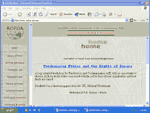 ACFOA acts as an intermediary between the Australian Government and Non-Government aid agencies. The website contains a list of all registered Australian overseas aid agencies and their websites, as well as other information about overseas aid.
ACFOA acts as an intermediary between the Australian Government and Non-Government aid agencies. The website contains a list of all registered Australian overseas aid agencies and their websites, as well as other information about overseas aid.
Many of our members already know the New Internationalist as a high-quality magazine, having learnt about FairShare through an advertisement within its pages. What you may not know, though, is that the New Internationalist shop stocks fair trade items, such as linen, clothes, footballs!, resources for teachers, as well as, of course, coffee.
(See also their general information about fair trade.)
(Links are to the Australian NI site. NI also have shops in NZ, UK, Canada, and USA.)
The Fairtrade Foundation is a UK organisation which exists to ensure a better deal for marginalised and disadvantaged third world producers. The Foundation awards a consumer label, the Fairtrade Mark, to products which meet internationally recognised standards of fairtrade.
Fair Trade is not yet well known in
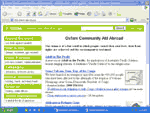 Oxfam Community Aid Abroad
Oxfam Community Aid Abroad
This large and well respected organisation is the result of a merger between Oxfam and Community Aid Abroad. It is a major player in community based development, and has a significant Fair Trade presence.
When you click on the "Give Free Food" button on the home page of The Hunger Site, funding is generated for the purchase and distribution of staple food to those in need. Funds are paid by site sponsors. In 2000, daily clicks yielded over USD3.4 million for hunger relief organizations working to provide food and hope to the hungry around the world.
Bob Oorts Website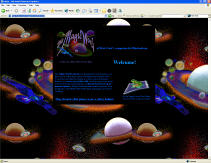
The 'Magic World' web site was designed for your pleasure, as a place of Art, rather than a place of business for business' sake.
http://www.users.bigpond.com/boboort
ATTAC
ATTAC fights for democracy and transparency in the global financial system.
www.australia.attac.org
